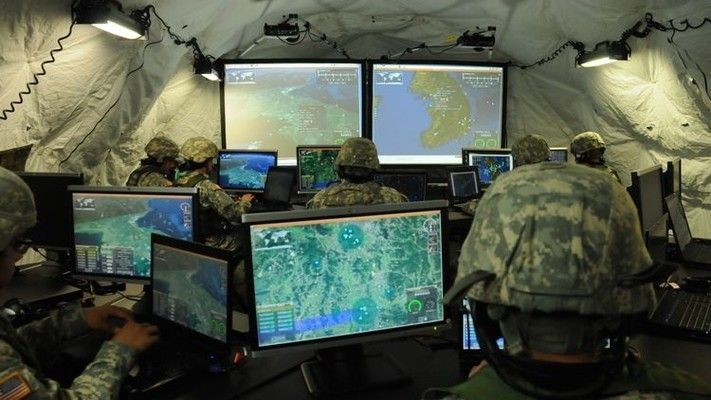Pentagon Procures the “Brain” for the Polish Air Defense System. Delivery on Time

US DoD concluded a contract concerning delivery of two battery-level sets of the IBCS air defence management system. These would be delivered to Poland via the FMS procedure, within the scope of phase one of the Wisła programme. Both Polish Ministry of Defence and Northrop Grumman confirmed that delivery of the system has been planned to happen until 2022. Within the framework of the very same agreement software of the system would be then updated, until mid-2026.
According to the release issued by the Pentagon, Northrop Grumman was awarded a USD 349.4 million worth contract, covering the procurement of two battery sets of Integrated air and missile defense Battle Command System. This concerns both hardware as well as software. FMS funds out of the FY2019 budget have been allocated to that contract in an amount corresponding with the aforesaid value.
The Polish MoD also issued a release pertaining to the contract and IBCS delivery schedule. The MoD announced that the “Agreement signed on 13th March 2019 by and between the US Government and the Northrop Grumman company, concerning the acquisition of the IBCS system for the Polish WISŁA (phase I) programme assumes delivery of elements of the system to happen by 2022. The agreement also assumes that Northrop Grumman would be responsible for updating the software and providing IT support for the system until the year 2026. The Agreement signed does not mean that the system would be delivered to Poland later than 2022.”
Earlier on, as Defence24.pl had informed, the date of finalization of work contained in the FMS contract, could have had its roots in the fact that updates of the system would happen after it is delivered. Agreement concerning Phase I of the Wisła programme did assume that updates as such would be taking place in the future.
Implementation of phase I of the Wisła programme proceeds in line with the assumptions adopted at the MoD. Delivery of two IBCS-enhanced batteries is planned to happen in 2022 (as planned - ed.), while initial operational capability is assumed to be obtained in 2023/2024. The IBCS implementation process proceeds in line with the schedule set, in case of the US Army. Considering the fact that IBCS would be simultaneously introduced in the US and Polish military, the Poles are, in an ongoing manner, kept up to date, when it comes to the results of the individual work stages. This week the Polish delegates, headed by Col. Michał Marciniak, plenipotentiary for the WISŁA programme matters, are in the middle of talks in Huntsville, concerning the implementation of phase I of the programme, also discussing the details of involvement of the Polish delegates in the IBCS field tests (live fire) that are planned to happen in August 2019.
According to the statement issued by Northrop Grumman, the entire value of the contract is $713 million. The contract covers production of IBCS for WISŁA phase one, as well as support and software maintenance after the delivery, until mid-2026. As the company spokesperson told Defence24.pl "The $349 million is the incremental funding threshold since entire programs are not typically funded at once. Northrop Grumman will provide IBCS for two batteries (four firing units) to Poland planned for 2022.". The contract period of performance is to mid-2026 for software maintenance and logistics support, the spokesperson added.
“Poland is taking a leadership role in today’s complex threat environment by selecting IBCS over legacy stove-piped systems that were designed decades ago for a much different threat profile. IBCS is the future of multidomain operations and with it, Poland will have a state-of-the-art system to modernize its integrated air and missile defense capabilities,” said Dan Verwiel, vice president and general manager, missile defense and protective systems, Northrop Grumman. “Through the acquisition of IBCS, Poland will be in line with the U.S. Army’s future direction. Poland will have the flexibility to consider any radar and any interceptor, optimize sensor and effector integration and keep pace with an evolving threat.”
“Northrop Grumman continues to work closely with the Polish Ministry of National Defense and Polish industry toward a comprehensive offset program that meets the program goals and requirements. We look forward to continued collaboration and partnership with PGZ and its consortium of companies on this and future phases of the WISŁA program,” said Tarik Reyes, vice president, business development, missile defense and protective systems, Northrop Grumman. “We are pleased with the opportunity to deliver cutting-edge, net-centric IBCS technology to Poland and support the Ministry of National Defense’s modernization priorities.”
Under this foreign military sales contract for WISŁA, Northrop Grumman will manufacture IBCS engagement operations centers and integrated fire control network relays and deliver IBCS net-enabled command and control for four firing units. The IBCS engagement operations centers will be integrated with IBCS battle management software that maximizes the combat potential of sensors and weapon systems. IBCS engagement operations centers and network relays will be transported by Polish Jelcz vehicles.
The contract concluded recently is the third agreement signed by Pentagon that is related to finalization of the Polish Wisła air defence programme. Let us recall that Raytheon was awarded a 1.528 billion dollars-worth contract in September last year, covering the delivery of elements of the Polish Patriot system. The agreement in question also covers integration of the systems, with the expected deadline set in 2022. Meanwhile, on 28th February this year, Lockheed Martin received an order the value of which has been defined as USD 680 million. The aforesaid order concerns delivery of PAC-3 MSE/CRI missiles for 9 foreign users, including Poland and Sweden. Both nations above did order the Patriot system, but it is yet to be included in their inventories.
The above means that contracts concerning the basic elements of the Wisła system (Patriot systems, IBCS and PAC-3 MSE missiles) are now being implemented. We shall also remind ourselves of the fact that Poland procures two batteries/four fire units of the Patriot/IBCS system over the course of Phase I of the Wisła programme, including four sector coverage radars, more than 200 PAC-3 MSE missiles and some elements of the final Wisła system. When it comes to the PAC-3 MSE missiles, the agreement signed in late February, price and customer list considered, almost certainly does not pertain to all of the missiles procured by Warsaw. Further missiles would probably be a subject to further agreements, as further PAC-3 MSE production lots are manufactured. The whole programme has an estimated value of USD 4.75 billion.
The implementation of contracts concerning three main elements of phase I of the Wisła programme became reality. This is a major step forward towards introduction of a full-fledged air defence system. One should remember that Poland is the first foreign IBCS system user. Placing orders via the US DoD is a standard practice in case of the FMS procedure. Apart from the above, the MoD is willing to procure Polish vehicles and communication suites for the Wisła system, within the scope of phase I.
Offset Agreements Still to Be Concluded
Negotiation concerning the offset agreements related to Phase I of the Wisła programme, signed between the US and Polish companies, is still in progress. No final decisions have been made with regards to Phase II of the Wisła programme - and no formal Letter of Request has been sent to the Americans.
Recently, an agreement by HSW and Raytheon was signed - the information concerning the above was released on 14th March. The agreement in question is related to the launchers-manufacturing effort. However, as PGZ highlights, such supply order is covered by the intergovernmental contract and cannot be considered an offset commitment at all. It implements the US industry’s commitment to allocate 50% of the value of orders under the WISLA program to the Polish defence industry.
During Phase II Poland is willing to acquire 6 batteries with 360-degrees coverage fire control radars and a higher quantity of missiles. At this stage the Polish sensors are to be integrated with the IBCS system as well, which applies to the passive PCL-PET and active P-18PL radars. When it comes to fire control radars the Poles are planning to use the system which would be selected within the framework of the US LTAMDS programme. Within the scope of the missile, low cost SkyCeptor effector is being considered, but it is not the only option available.
Wisła system should also be integrated with the Narew SHORAD solution. Polish industry is going to play a key role in the Narew programme, delivering most of the sensors. Effectors are expected to be license manufactured in Poland. Technology transfer is also considered with regards to some of the C2 suite elements. However, the programme is still in infancy, when it comes to its implementation (analytical-conceptual phase). No decisions have been made. Polish Ministry of Defence is determined to accomplish the analytical-conceptual phase quickly for the NAREW operational requirement and to begin the implementation phase. Within the scope of the NAREW programme, it is considered to assign the leading role to the Polish defence industry. However, the final decision would be made after the analytical-conceptual phase is finalized – the Polish Ministry of Defence informs.
Read More: Pentagon Orders Patriots for Poland
